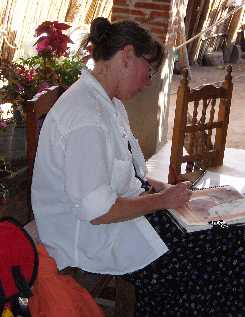
Dianne Roth sketching
in a weaving cooperative, Mexico
(#120441)
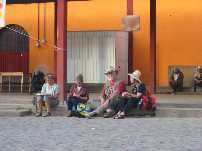
Sketching participants on a curb
in Oaxaca, Mexico
©2004 (#0130)
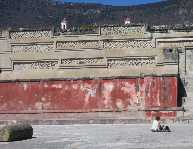
Mari le Glatin Keis sketching
the ruins of Mitla, Mexico
©2004 (#0155)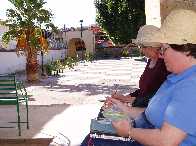
JoanElisabeth Reid and Betty Bernard,
Oaxaca, Mexico
(#170728)
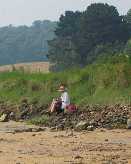
Dianne Roth sketching,
Brittany, France (#00012)
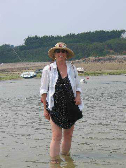
Dianne Roth, part of the scene,
Brittany, France (#00013)
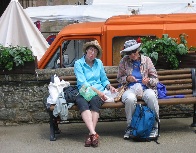
Karen Kreamer
and Louise Marie Zaerr,
Tregeier, France
©2005 (#1002)
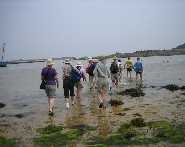
The hard way across the estuary,
Brittany, France (# 0930)
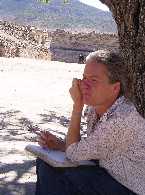 Barb Campbell sketching in Mexico
Barb Campbell sketching in Mexico
©2004 (#170710)
 Humble food (#1284)
Humble food (#1284)
|
Traveling With
Humility
1480 words
How To Become Part of the Scene
by Dianne Roth
While taking a sketching workshop with Mari Le Glatin Keis in France a couple of years ago, a fellow participant said, “I could live like this forever!” He was taken off guard when I replied, “No you couldn’t!” I went on to explain.
We were spending our 10 days together on an organic farm in the countryside of of Southern France. We were within walking distance of LaCoste, a small hillside village about ..... from Avignon. We would pile into Mari’s rented van and take excursions to other villages and markets and on off days we would wander the farm, sketching the sights and each other.
Let’s call him “Fred”. He was sprawled in a lawn chair in the shade of a gigantic tree, sipping our before dinner aperitif of red wine aged with sugar and walnuts, and eating the local olives. Life does not get much better than this. His languid voice was the give away.
As the guests of Danielle, whose farm had been in her family for 300 years, we were catered to and waited upon. Our beds were made while we ate her hearty, country breakfast. She worked in the vineyard and garden while we whiled away our hours in picturesque villages and markets. Our dinner was prepared as we put final touches on our daily sketches. In the early morning, as I took off for my sunrise walk, she was watering the new grass in the courtyard.
Fred would never make it as an organic farmer and bed and breakfast host. I pointed out that I thought he would miss his dishwasher and clothes dryer, not to mention that we were washing our own clothes in a bucket by the well. I, also, accused him of wanting the rest of the world to remain quaint and photogenic to enhance his vacations away from all the comforts of home.
I do not think I was that harsh, he did speak to me for the rest of the workshop, but I do feel I spoke the truth. Unless we travel the Five Star Route, we are hoping to find different cultures, picturesque vistas, and experiences that are new and exciting. And, happily, these new experiences are what open our minds and broaden our horizons. We become citizens of the world when we make connections near and far, and we learn that people are people the world around. That is truly when life gets as good as it gets. But, is there a cost? Do I, as a traveler, need the cultures I visit to stay quaint and poor so I can come home with stunning pictures?
The question is a difficult one. Why do we travel, if not to see the differences? It appalls me to find a McDonald’s in Oaxaca, Mexico, and a Comfort Inn in Southport, North Carolina. I want local food and a hotel that has green shutters and window boxes. I will happily stay in a chain motel near the airport before I leave, but I want something different when I arrive.
Our global economy is making the things we take for granted available the world over. All along the Atlantic Seaboard where I visited this winter, the family motels have been torn down and replaced with chain motels and condominiums. I found it flavorless. I longed for, and spent the day looking for, a quaint family motel. Locals looked at me blankly when I asked. They would dredge through their memories and point me along the road to a chain.
When I finally found myself in front of just what I was looking for, it felt like an illusion. It was delightful. Green shutters on the windows, flowers in the window boxes, the smell of fish in the air. The floor was aslant, the shower dripped, and the heater was a groaning monster in the window. I was in love! My sketches were inspired, my photos artistic, and my memories lovingly recorded in my journal.
Sadly, the motel has been sold and is scheduled for the wrecking ball within the year. It will be replaced with a condominium. The plumbing will work, the beds will be firm, all the rooms will be bright, airy, and perfectly conditioned. So, why do I mourn?
These questions have no clear answers. But, it is not enough just to ask the questions. As travelers, we have to struggle with what our world wide travels mean to our hosts as well as to ourselves. It is one of those good struggles that may have no end, but it brings a consciousness to our footsteps.
As a backpacker, I am well trained in the leave-no-trace ethic of the back country. What goes in, must be carried out... everything. Camp must be set up a certain distance from river banks to protect the riparian zones. Souvenirs can only be taken in photos or representations in a sketchbook. And still, our presence has an effect on the botanic and zoologic habitat. Stray seeds cling to boots. A careless step opens a pathway for erosion. A human, just standing close to the trees where monarch butterflies cling in Mexico, causes the air temperature to change and the butterflies fall out of the trees. The human footprint is hard to measure.
And yet, without seeing, we become provincial, nationalistic, rigid, narrow, judgmental, egotistic. Perhaps our travels should be less about quaint than about relationship. Through travel we can learn what it feels like to be in the minority, or how to make ourselves understood in a language we do not know, or how to look into the eyes of a stranger and see a friend. Perhaps travel, at its very basic, is political and bridges the gap between ideologies and style.
Try traveling in a different way. My sketching mentor, Le Glatin Keis, reminds her workshop participants, “Travel humbly. Humility allows you to see grandness in the simplest scene.”
Humility is the difference between sticking your camera in the face of a local carrying a basket of bread or sitting back and capturing the sway of her dress with quick strokes of a pen. You can pose the locals in quaint activities, seeing only the shallow details of the scene, or you can become part of the scene with a smile, a nod, or a simple greeting in the local language.
Traveling humble is using a quiet voice, attempting the language, having a smile on your face, sitting in the same spot for more than a minute, saying “excuse me” and “please” and “thank you”, and not complaining about the rain. After all, it is French rain! Humble is not taking it personal if the locals do not express deep honor at having the opportunity to wait on you or being offended if it feels like they just want your tourist dollars. Give them a break, they work hard, probably harder than you do.
Traveling humble is eating the local food, joining in the fun even if you are the butt of the joke, and having the good manners to let people know that you appreciate and enjoy them.
Humble is not flashing your money around, or being the big spender, or taking in the sights through the lens of your video camera.
Traveling humbly invites the locals into your experience. When you are calm and peaceful, relishing the experience with all of your senses, locals come close to look over your shoulder. As they watch you capture the color, texture, smells, sounds, and tastes of their world, you can experience a moment of intimacy with them. They love seeing their world through the eyes of a tourist. If you are free of self judgment, you can leaf through your journal, telling them about the children at the beach, the sheep being shorn, the magnificence of the ruins, the exquisite flavor of the molé, even when you do not know a word of their language.
Times are changing. McDonalds is everywhere and soon the only choice for lodging is going to be the insidious chain. Because of our global economy, everywhere is going to look like anywhere. Wherever you are will look just like home. It may even be a good thing when the rest of the world no longer has reason to be envious of Americans. Perhaps globalization will reduce the poverty and hunger around the world. I would trade quaint for that.
You do not have to eat at McDonald’s in Paris, but I am learning not to begrudge to them what is so much a part of our culture at home.
Yes, I travel. I love the picturesque houses on the hillsides of Luberon Valley. I languish on the rooftop terrace, sipping mescal in Oaxaca. I relish skinny dipping in the ice cold waters near Sweden’s arctic circle. But, as I look through my sketchbook and photos, I sense that I was not an outsider. I was actually a part of the scene.
Dianne Roth is a teacher, mother, grandmother, and freelance
writer. She lives in Oregon.
|
|











